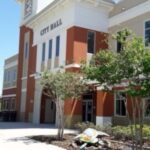The Palm Coast City Council’s recent meeting, focused on selecting a new city manager, was marked by public concern, divided votes, and ultimately, a decision to delay the final appointment until additional information could be gathered. The nearly three-hour session reflected both the weight of the decision and the importance of public trust in city leadership.
Public Comment Period Sets a Cautious Tone
The meeting opened with nearly 30 minutes of public comment, where residents voiced serious concerns about the city’s current trajectory and ongoing issues tied to development and infrastructure. The tone was pointed and, at times, emotional.
Kandi Stevens, a resident of District 3, took the floor to speak against what she described as “unchecked development” in Palm Coast. She also criticized the city’s budget priorities and questioned the salaries of certain administrative personnel. Her remarks drew nods from several in attendance, signaling broader community concerns about transparency and responsible governance.
Jeremy Davis, another resident, highlighted the flooding problems in newly developed areas. He described persistent water drainage issues and urged the council to consider the long-term environmental consequences of approving development without stronger infrastructure planning.
Gary Kunis added to the infrastructure concerns, describing his frustration with speed bump placement and canal system mismanagement in his neighborhood. His comments underscored a growing perception that city operations are struggling to keep up with growth.
First Attempt: Richard Hough’s Nomination Fails in 3-2 Vote
The council then moved into the city manager selection phase, beginning with Mayor Mike Norris making a motion to appoint Richard Hough. Councilman Ty Miller seconded the motion to bring it to discussion.
Hough, a candidate with experience in city administration, was one of two finalists identified through a nationwide search process. However, his nomination was met with immediate hesitation. Vice Mayor Theresa Pontieri, Councilman Charles Gambaro, and Councilman Sullivan voted against the motion, citing concerns that would be elaborated on later in the meeting.
With a 3-2 vote, Hough’s appointment failed.
Second Attempt: Paul Trombino’s Nomination Also Falls Short
Following the failed motion, Councilman Gambaro moved to appoint Paul Trombino, the other finalist under consideration. His motion was met with initial confusion regarding the vote. A clarifying revote was conducted, but the outcome remained the same: 3-2 against.
Council Members Sullivan, Pontieri, and Miller maintained their “no” votes, indicating that despite the narrowing of candidates, no consensus had been reached.
Budget Experience Becomes a Central Concern
In the aftermath of the failed votes, Vice Mayor Pontieri voiced a major point of concern that had gone largely unspoken during earlier discussions—budget management experience.
Palm Coast’s annual budget exceeds $421 million, a figure that Pontieri noted is substantially higher than either candidate has managed in their previous roles. She pointed out that the complexity of Palm Coast’s budget—along with its rapid population growth, infrastructure needs, and capital investment plans—demands a city manager with proven large-scale financial leadership.
Council members collectively agreed that without further insight into each candidate’s financial qualifications, it would be irresponsible to move forward with a final decision.
Council Agrees to Request White Papers
As a result of this discussion, the council unanimously agreed to request formal white papers from both Richard Hough and Paul Trombino. These documents will focus specifically on each candidate’s budget experience, including:
-
Development and oversight of large-scale budgets
-
Strategies for maintaining fiscal responsibility during growth
-
Experience managing capital projects and public funds
-
Use of data-driven approaches to track and adjust budget performance
The council requested that these white papers be submitted in time for review at the next scheduled business meeting on May 6 at 6:00 p.m..
Consultant Advises on Next Steps
Doug Thomas, the executive search consultant overseeing the hiring process, advised the council on how to proceed. He confirmed that both candidates would be contacted and given adequate time to prepare their white papers. Thomas expressed confidence that this additional step would provide the clarity needed for the council to move forward with a well-informed appointment.
Action Items and Administrative Follow-ups
In addition to the main agenda item, several action items emerged during the meeting:
-
Vice Mayor Pontieri was named lead negotiator for the contract process once a candidate is selected.
-
The City Manager’s office was asked to look into a missing sign issue in Seminole Woods, as mentioned during public comment.
-
Doug Thomas was tasked with ensuring that the white papers are submitted before May 5, giving council members time to review before their May 6 meeting.
-
The City Clerk was instructed to distribute relevant documentation regarding a building department investigation to all council members.
The meeting concluded without a definitive decision on Palm Coast’s next city manager, but council members and residents alike appeared to appreciate the measured approach. In a city undergoing rapid change, the council signaled that fiscal competence, transparency, and public trust are non-negotiable.
By requesting additional detail and delaying the vote, the council aims to ensure that Palm Coast’s next city manager is not only a skilled administrator but one capable of leading with confidence through a period of significant transformation.
The next business meeting is scheduled for May 6, 2025, at 6:00 p.m., where the council is expected to revisit the decision.










